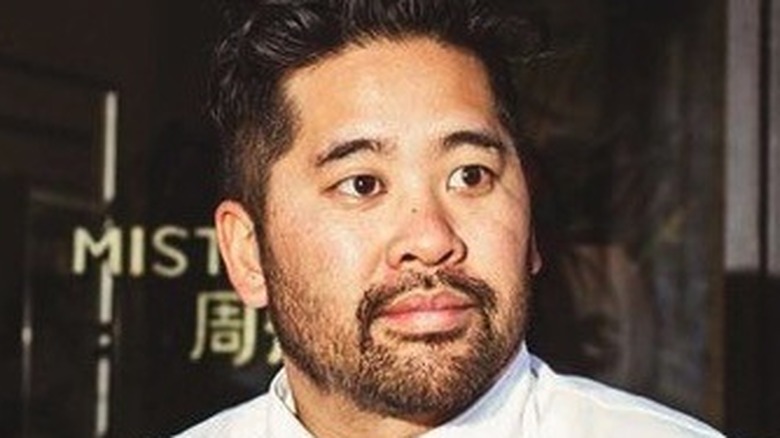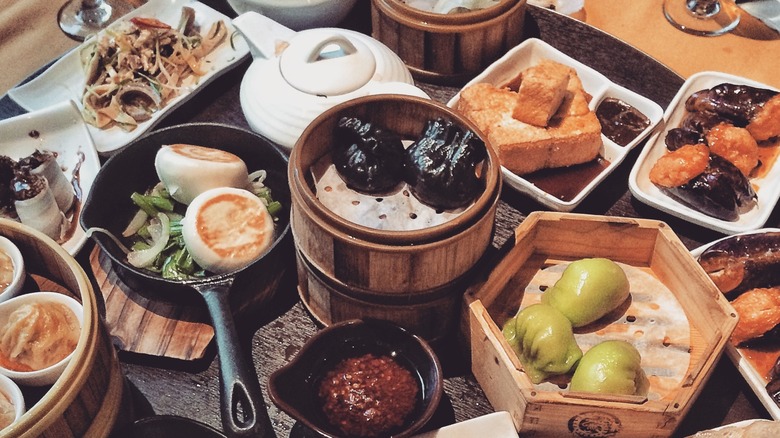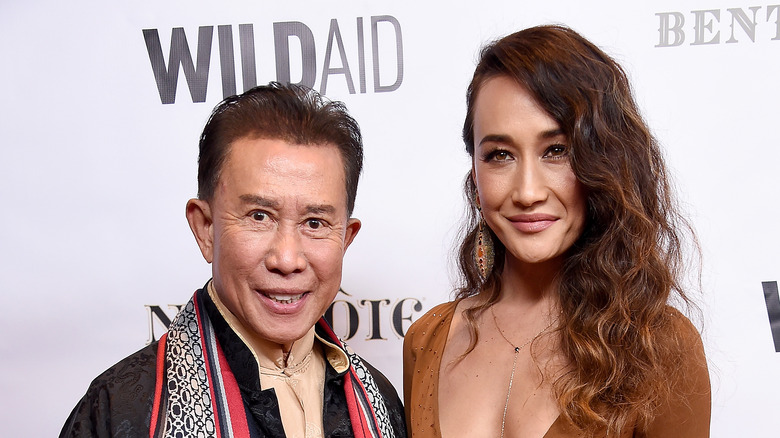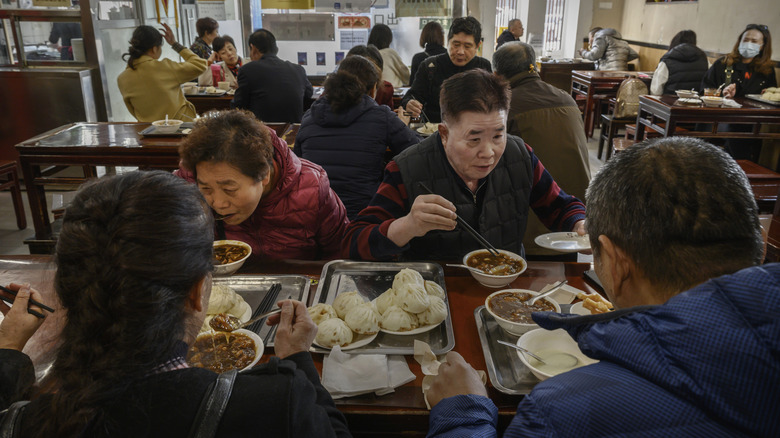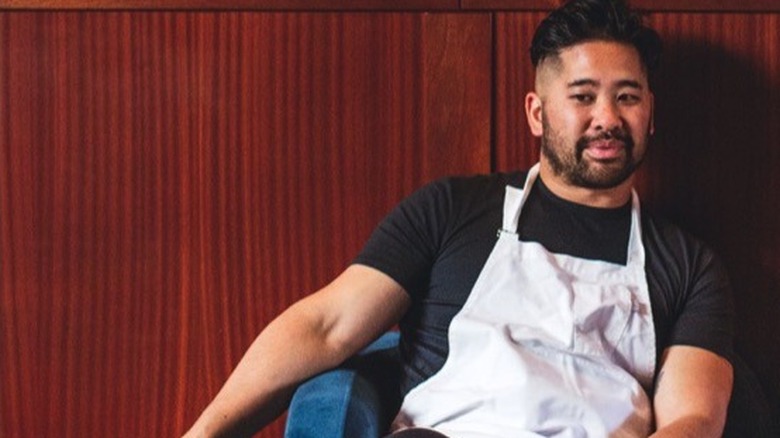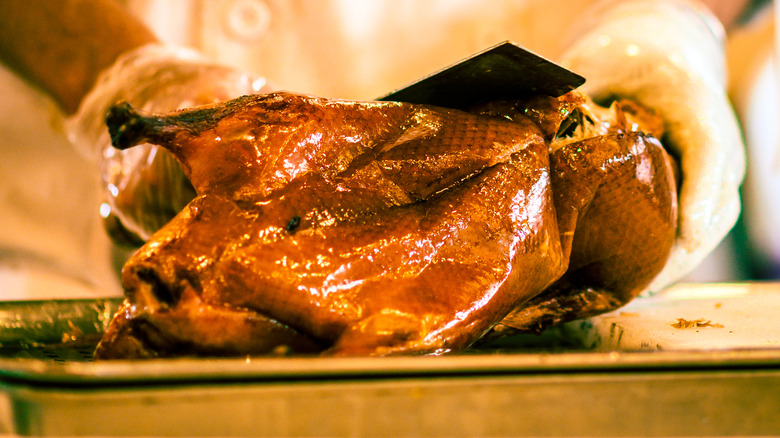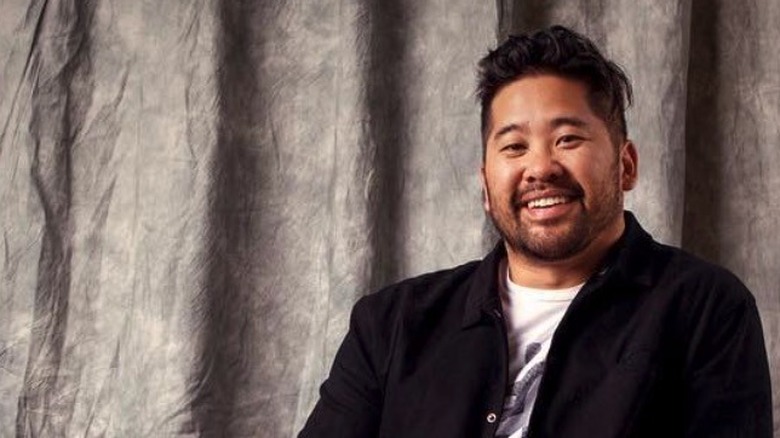Chef Brandon Jew Talks Authentic Chinese, Remy Martin Cognac, And Woks - Exclusive Interview
We may receive a commission on purchases made from links.
Brandon Jew is celebrated as a Michelin-starred chef behind one of the most popular Chinese restaurants in San Francisco, Mr. Jiu's. If you know anything about the Asian cuisine scene in SF, you know that standing out there is a major achievement — it's something like being a tree so large hikers notice you even as they pass among countless giants in the redwood forests up the coast from the Bay Area. Towering as the achievements of this SF Magazine "Chef of the Year" winner and two-time James Beard "Best Chef" award nominee (for 2018 and 2020) may be, Jew is nonetheless down to earth and even nonchalant about his achievements and abilities when in conversation.
During an exclusive Mashed interview, Jew — whose family name may have been carelessly Anglicized from "Jiu" during an immigration process several generations back, thus the "Jiu" spelling in the restaurant name to reclaim the ancestral title — discussed everything from cooking duck to carrying groceries for his grandma and why he thinks the wok may be the next piece of cooking equipment to have its major moment. He talked plenty about cooking Chinese food, and how "authenticity" in cuisines need not be seen as a rigid standard; indeed, Jew feels that for a cuisine to be authentic at all, there must be flexibility and evolution.
The conversation started not with a look forward, but with a look back.
Brandon Jew's early days in the kitchen
Did you grow up cooking from a young age or did you start cooking as you got a little bit older?
Actually cooking, I didn't do until a little later. I was the assistant to my grandma, when we had family dinners, but I didn't do much cooking. It was mostly helping with carrying groceries and sorting little things for her, like vegetables, or measuring stuff out. Things were very rarely weighed out, so if they were weighed at all, they weren't scaled, it was this many pieces of this and that many pieces of that.
Then I started messing around in the kitchen when I was growing up because my parents were working and I was like, "Well, I'm hungry, so I'm going to learn how to make something." I started cooking at home in that sense, but I didn't start professionally cooking until I was in college and I was cooking as basically a part-time job, not really thinking much of it in the beginning. The more I started cooking, the more I really loved how a lot of things were. I think it was a way of being creative. I'm a collaborator, so I really like working as a team. I was a bio major too, so I already had a love for plants and animals and was really interested in how they were basically like muscle structures. I [learned] what specific things about these plants make them unique. When you start to really see how those things intersect, at least for me, it made a lot of sense for me to continue cooking. I think later in my cooking career, I really started to understand my own identity within what I wanted to cook, and it helped me to have a way of expressing that.
Jew's journey to professional cooking
Was there a specific moment when you realized cooking was going to be a career or did it happen organically over time?
Every step along the way, I was excited about embarking on next steps. For me, travel was a big thing, so after I graduated from college, I moved to Italy because I wanted to cook and I looked at a lot of the culinary schools and talked to my coworkers and they're like, "Oh, you don't need to go to culinary school, you've already been cooking." A lot of my friends were like, "You should just go start in Europe," and so that's what I did, I spent a year in Italy, apprenticing at a couple restaurants. I lived upstairs, cooked all day, cooked all night, and that was a real introduction into Michelin star kitchens and for me, being immersed in the Italian culture and really seeing how prideful regionality of food is to them. [I realized] that I myself was also very prideful of the things that we had in the Bay Area and ingredients that we have here and the history of recipes we have here too.
Anyway, as far as a moment, I knew at that point I [was] wanting to dive deeper into the culinary arts, but along the way there's other things in my career — I left to cook in Shanghai for about a year and a half as well — so there's all these little points. I was really determined to get a certain kind of education, and some of it I knew I had to get on my own a little bit, and that meant traveling, that meant expanding my palette and my experiences.
The thing that steered me into Chinese cuisine, and I mention this in my book, is my grandma when she passed away. It was a point in my life that I realized I was feeling like it was actually more of my responsibility to learn Chinese cuisine, to have been able to really get [an] amount of detail into our family recipes. It propelled me to focus the rest of my career on Chinese cuisine, understanding it, and also being able to pass those traditions down. That's my point of view right now at [this stage of my career,] trying to pass on our cooking traditions and cooking techniques to another generation of cooks, especially in Chinatown. I think people have been coming to San Francisco Chinatown to experience Chinese American food at its forefront, and so I found a lot of inspiration in what has [come] before me in the neighborhood.
The chefs who inspire chef Brandon Jew
Who have been some of your biggest influences along the way of your culinary journey?
Definitely some family members for sure — my grandparents, and I have a couple uncles that are really great cooks, but in the professional kitchen world, Judy Rogers, she was a chef at Zuni cafe; Mike Tusk, the chef at Quince, and I considered them my real mentors. They showed me how to mix California ingredients — in their case, Judy was doing Mediterranean food and Mike does Italian food, but they're also very in tune with seasonality here and all the small farms and all the organic farms here. Having that shared ethos is something that I learned from them, and Martin Yan has been an amazing supporter — it's such a trip to me because it's someone you grow up watching and then we're hanging out one day.
Brandon Jew on his partnership with Rémy Martin
Why did you choose to partner with Rémy Martin, and what does the brand represent to you?
I feel super honored [by the partnership] because I think there's a couple things. First, that cognac is, the XO in particular, is the pinnacle of that celebratory feeling. In the Lunar New Year, we celebrate the abundance of the food and drink and we're sharing that amongst our friends and family. A lot of that feeling is supposed to feel abundant and luxurious. You want to start the year with all this at the table and you're wanting to attract all the good luck and start the year off in the best way possible and try to continue that for the rest of the year.
For me, it's pretty rare that we had some XO at the table, but later in our banquet tradition in our family we always made sure when my grandpa was with us towards the last parts of his life, it was important for us to have him know that we went all out for him, and [by] having XO Rémy Martin at the table, he lit up. That's definitely a tie that I have with the brand.
There's a lot of techniques that we use from my own French training. I think having cultures be able to share at the table and experience flavors together, that's some of the beauty of America and Chinese American cuisine and the appreciation of other cultures and using food and beverage as a way to connect and get to know each other better. That's really the way Chinatown was able to break a lot of stereotypes and break a lot of racism, in a genius way of crafting the food and the beverages that have people come to the neighborhood. It's awesome to be able to serve things [like that]. On our menu right now — we have a New Year-themed menu — it's so awesome to have little touches on there like caviar and sea urchin and truffles and things that make the dinner that much more special. I feel the same way about being able to add or use Rémy XO in our cocktails or even after the meal to have as something to sip on to finish the meal.
Brandon Jew talks authentic Chinese cooking
What do people in America misunderstand about Chinese cuisine, and what do you wish more people knew about contemporary Chinese food?
Authenticity is very personal to people — what they understand as authentic. There is tradition and there's history, but as far as Chinese cuisine, I'm interested in having people understand that it's also changing. It's evolving, and as we have these relationships with farmers and mix between our cultures and nature, those are the two things that are going to continue to evolve all cuisine. Contemporary Chinese cuisine, to me, is something that I think we're going to continue to see how it evolves across America, and the tradition of Chinese American cuisine is that you're taking some of what is local, what is there, and using Chinese cooking techniques and then developing a dish that bridges the two.
I'm really interested in using that as a creative vantage. When we start thinking about the R&D of a new dish, that is an angle that sometimes we use because of the tradition of the chefs that have come through Chinatown. The other misconception is that a lot of times, people don't really know how nuanced the cuisine is; some of the finer points of Chinese cuisine is a lot of detail. Take a simple dumpling and what goes behind that, like making the wrappers — some of the most skilled dumping makers can just use the back of a cleaver to literally smack it and then spread it. It's almost the same. It's a very consistent thickness of those wrappers, and I've seen it with my own eyes, it's crazy. They can lift it up with their cleaver and toss it to the person next to them, and the person basically takes their other hand, puts the exact amount of filling in there, crimps it, exact distance between each plate, then it gets cooked to order and given to you.
That is so much craftsmanship and the muscle memory, and the repetition of doing that is a skill that can't be easily replicated. It takes years and hours to be able to have that kind of skill. Those are some of the things that sometimes people [misconceive about] Chinese cuisine. I also am really excited because now, more than ever, I've also felt that people have a wider understanding of Chinese cuisine and understand, maybe in a general sense, about all the regions within China and the cuisines there. It's an exciting time for the cuisine and I feel really hopeful for this next generation of Chinese American concepts that I keep hearing about.
Brandon Jew on the growing profile of Asian American chefs
What do you think the generation of younger Asian American chefs, what are they doing for Asian cuisine in America, and for the culinary world in general?
As far as the responsibility goes, I feel lucky and I feel like I have a lot of gratitude for the chefs that have come before me, because it wasn't as easy before to be able to want to express a culinary artistry point of view of cuisine, especially for Chinese cuisine. [Thanks to] the groundwork that was put in and the things that those chefs have done before, I feel really fortunate that now we have a different position in the industry. I joke with some cooks that have come through that, for a while, everyone's getting pizza ovens and charcoal grills and everything. I'm waiting for people to start installing woks into their modern kitchens and start to understand the beauty of wok cooking, and also the complexity of it.
Equipment aside, part of trying to get our book out was because a lot of recipes [and] techniques sometimes get passed down within kitchens with something like, I don't want to say secrecy, but there's some information that sometimes doesn't get passed to each other and shared to each other. The more we can share our cuisine and the techniques and the specifics of it, the more it will actually be understood and the more it will be hopefully practiced. A lot of cooking is honoring the people that have taught you those recipes before or taught you those techniques before and it's a way of remembering people. For me, there's a lot of purpose in cooking and I'm hoping that brings a lot of inspiration to another generation.
The one dish from Mr. Jiu's you have to try
What is one dish from Mister Jiu's that people simply have to try?
This is the complicated part of people's relationship with Chinese food in America. There's so many different levels of what people find enjoyable in Chinese cuisine. For me, something that we've had on the menu that we have continued to make edits and improvements to, is our duck. It's a very labor-intensive process which goes from some of the initial butchering to air pumping, Peking style, and then basting and then aging and then smoking and then roasting and then carving. It goes through quite a process to get to the plate, but I think it's pretty spectacular. If that's the one dish, if you had one day with us or one night with us, and didn't know when you would come back, that would be what I would say you should try. There's a lot of other things that I probably would want to sprinkle in there too.
Chef Jew's favorite cuisines and favorite ingredients
What other cuisines do you most enjoy to cook and to eat?
I still have a love for Italian cuisine because a lot of the beginning of my training was Italian, so that's definitely something that I have a lot of memories with. I love so many cuisines, but Italian is probably the first one that I would choose.
If I had to choose another, I really love Korean food, I love Japanese food, I love it all, I don't know what I don't like, I think that's it. Something that I'm very interested in within the Chinese diaspora is Union cuisine, I'm really kind of interested in [that] and the Xinjiang cuisine. Those would be my two regions within China that I'm very interested in.
Do you have a single favorite ingredient?
[If I had to choose only one,] I would say the scallion, the green onion.
Brandon Jew's advice for home cooks
What is some advice you have for the home cook who wants to improve his or her Chinese cooking?
I would get two pieces of equipment: I would get a bamboo steamer and I would get a wok, and having those two pieces of equipment understood will open [possibilities]. You'll be able to execute the kinds of dishes [you want] in a more successful way. There's something about the way the steam, and the quality of the steam out of a bamboo steamer, that is really special. The shape of the wok and understanding the sequence of ingredients as they go into the wok is really important; it's one of the main observations when you're cooking in a wok, understanding how to cut your ingredients [so they] work with each other, and knowing when to be putting in those ingredients or liquid seasonings. It's a lot of observation of what's happening in the wok and having your next ingredient ready to be going into wok.
Learn more about Rémy Martin XO's Lunar New Year edition here and follow Brandon Jew on Instagram.
